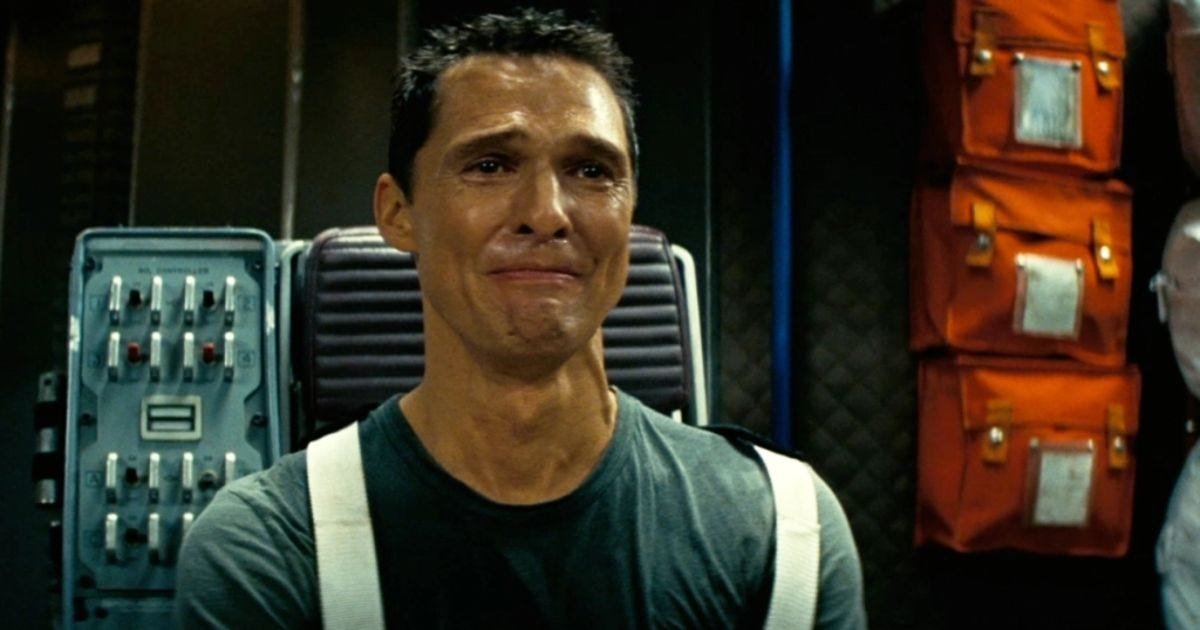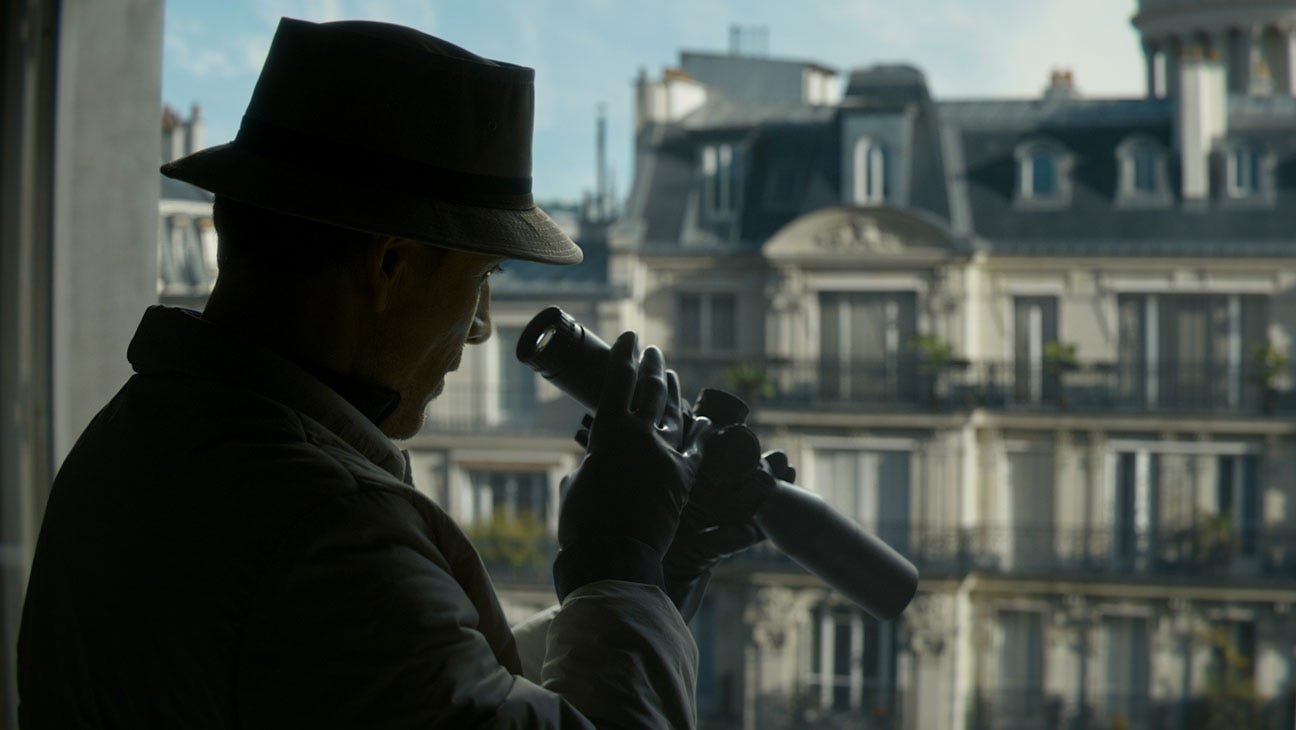When Do I Start, Boss?
Something that I’ve been thinking about a lot lately as I’ve been lining up some new film projects is when in the production process composers come along to join the film.
In other words, how does the timeline for a composer affect what they end up ultimately composing for the finished film?
As I see it, there are a couple different options, each with their different pros and cons.
Early Access
Still from Christopher Nolan’s Interstellar
As Christopher Nolan finishes up his final Batman film, he whispers to Hans Zimmer, “My next film is going to be about a father and a son. Can you write me some music that will be the theme for me when writing it?” So the story goes.
What Zimmer ended up writing was a little piano riff that ended up being the main musical thread in the score for Nolan’s film Interstellar.
Entering at the idea/writing stage is a particular way film composers can come to projects and my inkling is this tends to happen for composers who have directors they work with frequently (like then Nolan/Zimmer), but it can happen in other instances too.
As I’ve spoken about frequently on this newsletter, I loved the score for Poor Things. Composer Jerskin Fendrix was essentially plucked up from relative obscurity to score because film director Yorgos Lanthimos found his album and thought they shared a similar sensibility. Beginning to write music before any production had started, Fendrix worked off of the script and concept art for the film, and then retrofitted that music back into the film after/as it was edited.
Fendrix had quite a bit more to work off of than Zimmer in his example, but both stories illustrate varying versions of what I’m calling the “early access” type project.
Before production, but with an inkling of what the film is going to be, this way of working is probably my favorite way of working, though it has its downsides as well.
Pros:
You aren’t initially bound by film’s edit and in that sense it’s the most creatively freeing way to join a film project.
Many editors like editing with temp music, so you may circumvent having to work off of temp music, if you have enough time to write a bunch of material the director likes before the editor starts getting to work.
More time, in general. The earlier you’re coming in on a project, the more time you have to write music for it, period. This is great for quality control, building a writing routine, and really sitting in the idea or story. It’s also great for getting to know the director you’re going to be working with.
Cons:
You may end up writing a lot more music and scrapping much of it, because you have the time to afford doing that. When you come on the project later in the process,
Once you get the edit, you will likely have to change the compositions that you may have fallen in love with since they have been with you longer than if you wrote to the picture.
Depending on the composer, this could be too hypothetical and open a way of working. Some composers can’t just write music for music’s sake, even with nuggets of an idea, and need to see the images their music will be scoring in order to write that music. If that’s you, then this probably isn’t you’re ideal way to come to a project.
I’ve Seen Footage
This is what I’d venture to say is the most common way of coming to a project, coming on during the post-production process.
Perhaps you saw a script of the project before, but due to scheduling you weren’t able to get started on writing music yet. Maybe there was some ideating a little on instrumentation and style, but you probably had to finish another project first, and you’re joining as the editors are starting an assembly.
Pros:
If you are a composer who likes to have something more tangible to work off of, than composing in this manner is a lot easier.
If the assembly is being edited as music is being produced, this can be a very fruitful collaboration, iterating together and co-creating in an even more intimate way, as opposed to if you were handed an already finished edit and had to compose on top of that.
As the edit changes, you can adjust as you go. With this spontaneous, on-the-go work style, it’s difficult to fall in love with certain pieces, and easy to adjust as you need to.
Cons:
The edit can change… a lot, and the music will change with it. This constant readjustment can be challenging. A few frames are added to a shot? Well now you have to figure out how to adjust your chord progression so you still end on a satisfying home-base. Sometimes composers get these during a recording session, and work with arrangers to adjust the music in a recording studio, producing new sheet music, and having the players re-record.
Another aspect of this changing edit is that the movie will change, perhaps in ways you disagree with, perhaps in ways you do. Either way, you’ll have to score it.
You can come across temp music in this stage, as the editor is putting the film together, which is nice in a way, since you get a sense of what the director is looking for. But for most composers is likely more of a con, since it creates limitations around what you compose, which I’ve talked about in past posts.
Hired Gun
Still from David Fincher’s The Killer
This would probably be my least favorite way to come to a project, though it also has its pros. “Hired gun” is what I’d refer to when a film is nearly completed, past the production and edit stage to a locked or nearly locked edit, and needs music composed for that edit.
Pros:
What you see is what you get. The story is there. If you are a composer who likes to have something tangible to work off of, than composing in this manner is ideal.
Little to no edit changes here, you won’t have to deal with as many timing changes and small tweaks.
If the project isn’t your favorite, this is likely a way of working where you’d be involved with it the least amount of time.
Cons:
Not much time for ideating and freeform composing. With the film nearly being complete and deadlines fast approaching, you might not have much time to experiment.
If you signed on to the movie before production and the finished product is not working as well as anticipated, the director and team may put much pressure on the score to “save” the film. It can happen, but not usually. Perhaps certain scenes, but a whole film is highly unlikely.
This would probably be the most rushed way of working, since the film is nearly done. On some big projects, you’d even have composing assistants helping to write cues if the credited composer can’t write enough in time for the deadlines.
How Do These Approaches Change The Score?
The answer to this question is a bit more ethereal. But I can make some guesses.
“Early Access” scores are likely the most experimental. With a longer amount of time connected to the project, and the more broad idea stages, there’s a lot of room for experimentation. That being said, it’s a lot more likely for a director to fall in love with a piece of music the composer writes and force it into the final movie, even if it maybe isn’t best for the project.
“I’ve Seen Footage” scores might have a healthy medium of both experimentation and conventionality. Being able to assemble the edit and the film simultaneously, the score might be more tied to the edit in an organic way.
“Hired Gun” scores are likely to lean on convention. Out of time constraints and adhesion to temp music, these scores might not be as memorable, since they would sound a lot like other scores. However, they might feel more cohesive since all of the music is written quickly, at around the same period of time.
All in all, my favorite here is definitely “early access.” So, directors: got a new seed of an idea and need a composer eventually? Hit me up!
will dinola (he/him) is a film composer, musician, and writer currently working in new york city
he is interested in people’s passions and pushing the art of film scoring to new horizons
he writes about his experience in a newsletter called “do”


